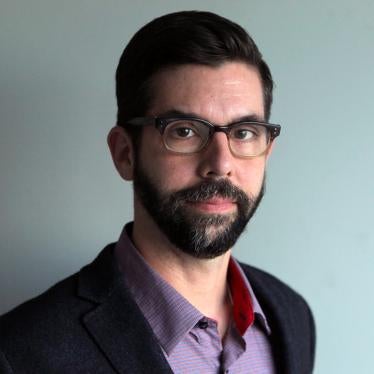As researchers for Human Rights Watch in Kosovo, we solemnly went about our work, taking photographs and interviewing surviving members of the Delijaj family. Journalists in the Balkans often asked me whether there would be justice for murders like these. I had always assured them there would be, hoping my enthusiasm would make it a reality. But in truth, I never let myself believe that Slobodan Milosevic would be arrested. I never thought then, standing in the forest, that one day I would face Yugoslavia's former president in court.
In June, nearly four years after those killings, I was escorted to the antechamber of the war-crimes tribunal at The Hague. The room reeked of cigarettes. Smoking is not allowed in the building, but forbidding witnesses from the Balkans their nicotine would be a crime itself. I flipped through the index cards I had prepared. On one side were the names of Kosovo villages -- Prekaz, Izbica, Cuska. On the other were the number of executions and a date -- 58 killed on March 5, 1998; 146 to 166 killed on March 28, 1999; 41 killed on May 14, 1999. Soon, a black-robed clerk knocked and told me it was time.
The armrests of the witness chair were smeared black from the sweat of those who had come before. To my right sat the prosecution; to my left was the accused. Milosevic leaned back defiantly, one arm draped over his chair, looking out at the gallery watching the trial. Three judges, a Jamaican, a Briton and a South Korean, sat in front wearing black robes with red trim.
First, the prosecution led me through our grim findings: forced expulsions of ethnic Albanians, mass executions, rape and sexual abuse. Photographs of the Delijaj family were shown, including the bodies of Donietta and Gentiona, 5 and 7, being carried out of the forest. I remembered their makeshift tent, a plastic tarp draped over wooden posts, where the family had been hiding, and a mattress soaked blood red.
Direct testimony lasted an hour. Now I was his. Acting as his own lawyer, Milosevic has taken every opportunity to cross-examine witnesses, often dredging up details about their private lives. I turned slightly to the left and looked at the accused. To my surprise, he smiled from across the room. Did he know something I didn't? Or was he trying to intimidate me?
I don't know why, but I smiled back. It just came over me, maybe from rattled nerves. There was something amusing about this situation, that a once-all-powerful president was forced to confront a pesky human rights activist from New York. After years in the field tracking the havoc he caused, it was he and I in this room. Of course, we were hardly alone. Cameras from all sides pointed at me, whirring mechanically as they changed their angles of attack. I wanted to testify even though I knew that many Serbs who watched these court proceedings saw Milosevic as a heroic fighter against the world -- his team's star scorer playing in the World Cup.
He spoke of global conspiracies against the Serbs; I listed concrete crimes of the army and police. He accused me of singling out the Serbs for committing atrocities in order to justify the NATO bombing of Yugoslavia. Serbian and Yugoslav government leaders stood accused, not the Serbian people, I told him. It was as if we were moving in parallel worlds. His diatribes were aimed at the invisible audience back home, not the court. He turned away from the judges, toward the gallery beyond the bulletproof glass, when he accused me of ''working hand in glove with NATO'' or writing anti-Serb statements from the comfort of New York. In the end, he put forth arguments commonly heard from a bar stool.
''You are a New Yorker,'' he said after nearly two hours of cross-examination. ''How many killings and rapes, for example, are committed every day in New York?''
''Don't answer that,'' Richard May, the presiding judge, said. Milosevic quickly returned to his theme. ''How come that you as an American, as a New Yorker, you take greater care of the human rights of Albanians in Yugoslavia than you do about human rights of Americans in America?''
''Irrelevant,'' May snapped. ''Next question.''
The question was irrelevant to the legal charges against him. But this line of reasoning couldn't fail to impress Serbs who believe they have been unfairly singled out for attack. Minutes later, our dance was done. I got up to leave, the armrests slightly blacker from my sweat.
=========
Fred Abrahams is a former senior researcher for Human Rights Watch.







